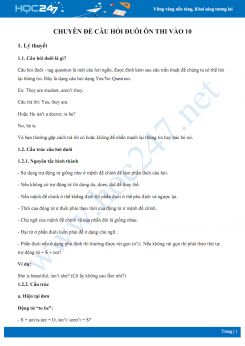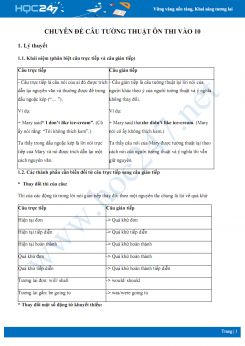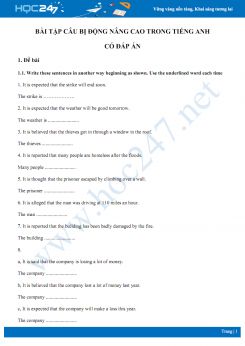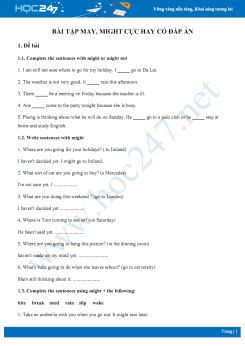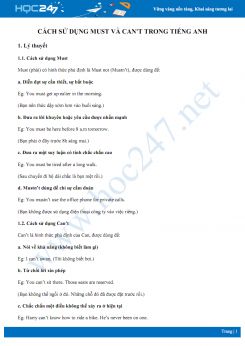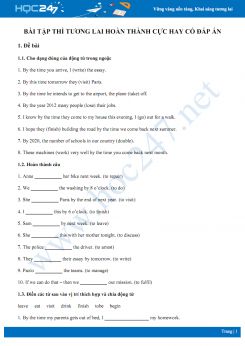Dưới đây là tài liệu Chuyên đề mạo từ ôn thi vào lớp 10 đã được Hoc247 biên soạn. Với phần lý thuyết và các dạng bài tập khác nhau, các em sẽ có cơ hội luyện tập và chuẩn bị thật tốt cho kì thi tuyển sinh vào lớp 10 sắp tới. Mời các em cùng xem chi tiết tư liệu ngay sau đây.
CHUYÊN ĐỀ MẠO TỪ ÔN THI VÀO LỚP 10
1. Lý thuyết
1.1. Định nghĩa
Mạo từ là từ dùng trước danh từ và cho biết danh từ ấy đề cập đến một đối tượng xác định hay không xác định.
1.2. Phân loại và cách dùng
a. Indefinite article (mạo từ không xác định): A/An
- A, an: đề cập đến một đối tượng chung hoặc chưa được xác định rõ. Đối tượng lần đầu được nhắc tới
- A đứng trước một phụ âm hoặc một nguyên âm có âm là phụ âm.
Ex: a game (một trò chơi), a university, a European
- An đứng trước một nguyên âm hoặc một phụ âm câm.
Ex: an egg (một quả trứng), an hour (một giờ đồng hồ).
- An cũng đứng trước các mẫu tự đặc biệt đọc như một nguyên âm.
Ex: an SOS (một tín hiệu cấp cứu); an MSc (một thạc sĩ khoa học), an X-ray (một tia X).
Cách dùng
- Trước một danh từ số ít đếm được.
Ex: We need a microcomputer (Chúng tôi cần một máy vi tính). / He eats an ice-cream.
- Trong các thành ngữ chỉ số lượng nhất định.
Ex: a lot (nhiều); a couple (một cặp/đôi); a third (một phần ba) / a dozen (một tá); a hundred (một trăm); a quarter (một phần tư)
* Không dùng mạo từ bất định(a / an) trong các trường hợp sau:
- Trước danh từ số nhiều
- Trước danh từ không đếm được
Ex: He gave us good advice (Ông ta cho chúng tôi những lời khuyên hay).
I write on paper (Tôi ghi trên giấy)
- Trước tên gọi các bữa ăn, trừ phi có tính từ đứng trước các tên gọi đó
Ex: They have lunch at eleven (Họ dùng cơm trưa lúc 11 giờ)
But: You gave me a delicious dinner (Bạn đã cho tôi một bữa ăn tối thật ngon miệng).
The bicycle (Một chiếc xe đạp) / The bicycles (Những chiếc xe đạp)
b. Definite Article (Mạo từ xác định) – THE
- Dùng "the" khi danh từ chỉ đối tượng được cả người nói lẫn người nghe biết rõ đối tượng nào đó (được nhắc lại) , dùng cho cả danh từ đếm được (số ít lẫn số nhiều) và danh từ không đếm được..
Ex: The truth (sự thật)
* Cách dùng:
- Khi vật thể hay nhóm vật thể là duy nhất hoặc được xem là duy nhất
Ex: The sun (mặt trời); the sea (biển cả) / The world (thế giới); the earth (quả đất)
- Trước một danh từ, với điều kiện danh từ này vừa mới được đề cập trước đó.
Ex: I saw a beggar.The beggar looked curiously at me.
(Tôi thấy một người ăn xin. Người ăn xin ấy nhìn tôi với vẻ tò mò)
- Trước một danh từ, với điều kiện danh từ này được xác định bằng một cụm từ hoặc một mệnh đề.
Ex: The girl in uniform (Cô gái mặc đồng phục). / The mechanic that I met (Người thợ máy mà tôi đã gặp).
The place where I waited for him (Nơi mà tôi đợi anh ta).
- Trước so sánh cực cấp, Trước first (thứ nhất), second (thứ nhì), only (duy nhất).... khi các từ này được dùng như tính từ hay đại từ.
Ex: The first day (ngày đầu tiên). / The best time (thời gian thuận tiện nhất). / The only way (cách duy nhất)
- The + Tính từ (tượng trưng cho một nhóm người)
Ex: The old (người già); the rich and the poor (người giàu và người nghèo)
- The dùng trước những danh từ riêng chỉ biển, sông, quần đảo, dãy núi, tên gọi số nhiều của các nước, sa mạc, miền.
Ex: The Pacific (Thái Bình Dương);The Netherlands (Hà Lan)
- The + họ (ở số nhiều) nghĩa là Gia đình ...
Ex: The Smiths = Gia đình Smith (vợ chồng Smith và các con)
* Không dùng mạo từ xác định – THE khi
- Trước tên quốc gia, tên châu lục, tên núi, tên hồ, tên đường. ( trừ US, UK, Philipines)
Ex: Europe (Châu Âu),), France (Pháp quốc), Downing Street (Phố Downing)
- Sau sở hữu tính từ (possessive adjective) hoặc sau danh từ ở sở hữu cách(possessive case) .
Ex: My friend, chứ không nói My the friend. / The girl's mother = the mother of the girl (Mẹ của cô gái)
- Trước tên gọi các bữa ăn.
Ex: They invited some friends to dinner. (Họ mời vài người bạn đến ăn tối)
- Go to bed/hospital/church/school/ work/prison (Đi ngủ/đi nằm bệnh viện/đi lễ/đi học/đi làm/ đi tù),
But: They went to the school to see their children's teacher (Họ đến trường để gặp thầy của con họ)
She will get a bus at the church (Cô ta sẽ đón xe búyt ở chỗ nhà thờ).
2. Bài tập
2.1. Put "an", "a", "the" or Ø (nothing):
1. My birthday is _____ Sunday afternoon.
2. It doesn't often snow here at _____ Christmas. We haven't had _____ White Christmas for many years.
3. We came here in _____ summer of _____ 1969.
4. _____ Thanks giving is in _____ November. The Church of England dates from _____ year 1534. I like driving at ____ night. The roads are quite. Oh, I don't like driving in ____ park. I'd rather travel during___ day.
5. Are you doing anything at _____ weekend? + I don't think so. Well, come over on _____ Sunday.
6. __ meals we had weren't very good. We had___ breakfast in the hotel and that wasn't too bad. We usually went out for _____ lunch because _____ lunch they served in the hotel was always the same _____ dinner we had in our first evening was pretty a few, so we tried a few restaurants. On our last evening we had _____ marvelous dinner in a Chinese restaurant, but that was an exception.
7. Rita plays _____ violin and her sister plays _____ guitar.
8. On our trip to _____ Spain, we crossed _____ Atlantic Ocean.
9. David attended _____ Princeton University.
10. _____ Florida State University is smaller than _____ University of Florida
11. _____ chair that you are sitting in is broken.
12. _____ Civil War was fought in _____ United States between 1861 and 1865.
13. _____ big books on _____ table are for my history class.
2.2. Write a or an in the space:
|
1. _____ unreasonable decision |
6. _____ X- ray |
11. _____ elephant |
|
2. _____ universal problem |
7. _____ UFO. |
12. _____ hospital |
|
3. _____ unit of work. |
8. _____ T shirt |
13. _____ BBC programme |
|
4. _____ eucalyptus tree |
9. _____ happy girl |
14. _____ UNESCO worker |
|
5. _____ honorable man. |
10. _____ H-bomb |
2.3. Put in a/an or the.
1. This morning I bought a newspaper and .... magazine. .... newspaper is in my bad but I can't remember where I put .... magazine.
2. I saw .... accident this morning. .... car crashed into .... tree. .... driver of .... car wasn't hurt but .... car was badly damaged.
3. There are two cars parked outside: .... blue one and .... grey one. .... blue one belongs to my neighbours; I don't know who .... owner of .... grey one is.
4. My friends live in .... old house in .... small village. There is .... beautiful garden behind .... house. I would like to have .... garden like that.
2.4. Put in a/an or the.
1. a, This house is very nice. Has it got .... garden?
b, It's a beautiful day. Let's sit in .... garden.
c, I like living in this house but it's a pity that .... garden is so small.
2. a, Can you recommend .... good restaurant.
b, We had dinner in .... very nice restaurant.
c, We had dinner in .... best restaurant in town.
3. a, She has .... French name, but in fact she's English, not French.
b, What's .... name of that man we met yesterday.
c, We stayed at a very nice hotel – I can't remember .... name now.
4. a, There isn't .... airport near where I live .... nearest airport is 70 miles away.
b, Our flight was delayed .We had to wait at .... airport for three hours.
c, Excuse me, please. Can you tell me how to get to .... airport.
5. a, Are you going away next week? No, .... week after next.
b, I'm going away for .... week in September.
c, Gary has a part time job. He works three mornings .... week.
2.5. Put in a/an or the where necessary.
1. Would you like apple?
--> Would you like an apple?
2. How often do you go to dentist?
.................................
3. Could you close door, please?
.................................
4. I'm sorry. I didn't mean to do that. It was mistake.
.................................
5. Excuse me, where is bus station, please?
.................................
6. I have problem. Can you help me?
.................................
7. I'm just going to post office. I won't be long.
.................................
8. There were no chair so we sat on floor.
.................................
9. Have you finished with book I lent you?
.................................
10. My sister has just got job in bank in Manchester.
.................................
11. We live in small flat in city centre.
.................................
12. There's supermarket at end od street I live in.
.................................
2.6. Answer these questions about yourself. Where possible use the structure like: (once a week / three times a day, ...)
1. How often do you go to the cinema?
Three or four times a year.
2. How much does it cost to hire a car in your country?
About $20 a day.
3. How often do you go to the cinema?
....................................
4. How often do you go away on holiday?
....................................
5. What's the usual speed limit in towns in your country?
....................................
6. How much sleep do you need?
....................................
7. How often do you go out in the evening?
....................................
8. How much television do you watch?
....................................
ĐÁP ÁN
2.1.
1. nothing
2. nothing, a
3. nothing, nothing
4. nothing, nothing, nothing, nothing, the dark, the day
5. the weekend, nothing
6. the meals, nothing, nothing, the lunch, the dinner, a marvelous dinner.
7. the violin, the guitar.
8. nothing, the Atlantic Ocean.
9. nothing
10. nothing, the University
11. the
12. the Civil War, the United States.
13. The big books, the table.
2.2.
|
1. an |
6. an |
11. an |
|
2. a |
7. a |
12. a |
|
3. a |
8. a |
13. a |
|
4. a |
9. a |
14. a |
|
5. an |
10. an |
2.3.
1. .... and a magazine. The newspaper is in my bag, but I can't remember where I put the magazine.
2. I saw an accident this morning. A car crashed into a tree. The driver of the car wasn't hurt, but the car was badly damaged.
3. .... a blue one and a grey one. The blue one belongs to my neighbours; I don't know who the owner of the grey one is.
4. My friends live in an old house in a small village. There is a beautiful garden behind the house. I would like to have a garden like that.
2.4.
1. a, a
b, the
c, the
2. a, a
b, a
c, the
3. a, a
b, the
c, the
4. a, an .... The
b, the
c, the
5. a, the
b, a
c, a
2.5.
2. the dentist
3. the door
4. a mistake
5. the bus station
6. a problem
7. the post office
8. the floor
9. the book
10. a job in a bank
11. a small flat in the city centre
12. a supermarket at the end of the street
2.6.
3. About once a month.
4. Once or twice a year.
5. 60 kilometres an hour.
6. About seven hours a night.
7. Two or three times a week.
8. About two hours a day.
---
Trên đây là toàn bộ nội dung của tài liệu Chuyên đề mạo từ ôn thi vào lớp 10. Để theo dõi nhiều tài liệu tham khảo hữu ích khác vui lòng đăng nhập vào hệ thống hoc247.net chọn chức năng xem online hoặc tải về máy!
Các em quan tâm có thể tham khảo tư liệu cùng chuyên mục:
Chúc các em học tốt!



